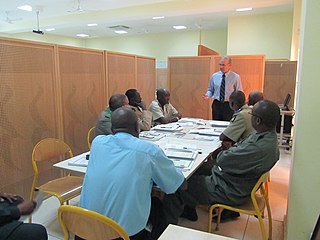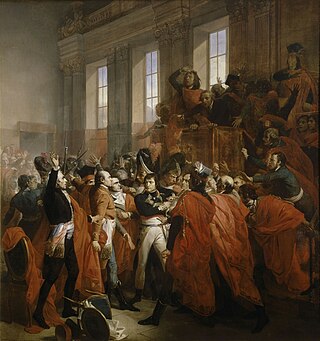Related Research Articles

Democracy is a form of government in which the people have the authority to deliberate and decide legislation, or to choose governing officials to do so. Who is considered part of "the people" and how authority is shared among or delegated by the people has changed over time and at different rates in different countries. Features of democracy often include freedom of assembly, association, property rights, freedom of religion and speech, inclusiveness and equality, citizenship, consent of the governed, voting rights, freedom from unwarranted governmental deprivation of the right to life and liberty, and minority rights.
A dictatorship is a form of government which is characterized by a leader, or a group of leaders, which holds governmental powers with few to no limitations on them. The leader of a dictatorship is called a dictator. Politics in a dictatorship are controlled by the dictator and they are facilitated through an inner circle of elites that includes advisers, generals, and other high-ranking officials. The dictator maintains control by influencing and appeasing the inner circle and repressing any opposition, which may include rival political parties, armed resistance, or disloyal members of the dictator's inner circle. Dictatorships can be formed by a military coup that overthrows the previous government through force or they can be formed by a self-coup in which elected leaders make their rule permanent. Dictatorships are authoritarian or totalitarian and they can be classified as military dictatorships, one-party dictatorships, personalist dictatorships, or absolute monarchies.

Cuba has had a socialist political system since 1959 based on the "one state – one party" principle. Cuba is constitutionally defined as a Marxist–Leninist state. The present Constitution of Cuba, which was passed in a 2019 referendum, also describes the role of the Communist Party of Cuba to be the "leading force of society and of the state" and as having the capability of setting national policy, and First Secretary of the Communist Party is the most powerful position in Cuba. The 2019 Constitution of Cuba identifies the ideals represented by Cuban independence hero José Martí and revolutionary leader Fidel Castro as the primary foundation of Cuba's political system, while also stressing the importance of the influence of the ideas of Marx, Engels, and Lenin.
In political science, a political system means the type of political organization that can be recognized, observed or otherwise declared by a state.

Democratization, or democratisation, is the transition to a more democratic political regime, including substantive political changes moving in a democratic direction. It may be a hybrid regime in transition from an authoritarian regime to a full democracy, a transition from an authoritarian political system to a semi-democracy or transition from a semi-authoritarian political system to a democratic political system. The opposite process is known as democratic backsliding or autocratization.
An illiberal democracy describes a governing system in which, although elections take place, citizens are cut off from knowledge about the activities of those who exercise real power because of the lack of civil liberties; thus it does not constitute an open society.
Modernization theory is used to explain the process of modernization within societies. The "classical" theories of modernization of the 1950s and 1960s drew on sociological analyses of Karl Marx, Emile Durkheim and a partial reading of Max Weber, and were strongly influenced by the writings of Harvard sociologist Talcott Parsons. Modernization theory was a dominant paradigm in the social sciences in the 1950s and 1960s, then went into a deep eclipse. It made a comeback after 1991, when Francis Fukuyama wrote about the end of the Cold War as confirmation on modernization theory and more generally of universal history. But the theory remains a controversial model.

Political culture describes how culture impacts politics. Every political system is embedded in a particular political culture.

Comparative politics is a field in political science characterized either by the use of the comparative method or other empirical methods to explore politics both within and between countries. Substantively, this can include questions relating to political institutions, political behavior, conflict, and the causes and consequences of economic development. When applied to specific fields of study, comparative politics may be referred to by other names, such as comparative government.

Barrington Moore Jr. was an American political sociologist, and the son of forester Barrington Moore.

Seymour Martin Lipset was an American sociologist and political scientist. His major work was in the fields of political sociology, trade union organization, social stratification, public opinion, and the sociology of intellectual life. He also wrote extensively about the conditions for democracy in comparative perspective. A socialist in his early life, Lipset later moved to the right, and was considered to be one of the first neoconservatives.
Democratic consolidation is the process by which a new democracy matures, in a way that it becomes unlikely to revert to authoritarianism without an external shock, and is regarded as the only available system of government within a country. A country can be described as consolidated when the current democratic system becomes “the only game in town”, meaning no one in the country is trying to act outside of the set institutions. This is the case when: no significant political group seriously attempts to overthrow the democratic regime, the democratic system is regarded as the most appropriate way to govern by the vast majority of the public, and all political actors are accustomed to the fact that conflicts are resolved through established political and constitutional rules. Since 1992, the number of democratic countries has been greater than the number of dictatorships and this number continues to grow as countries go through the process of consolidation. The notion of democratic consolidation is contested because it is not clear that there is anything substantive that happens to new democracies that secures their continuation, beyond those factors that simply make it 'more likely' that they continue as democracies. Many scholars have attempted to explain the factors that are responsible for democracies consolidating, which has led to the emergence of different ‘consolidation theories’ in the academic literature. Unconsolidated democracies often suffer from formalized but intermittent elections and clientelism.
In political science, the waves of democracy are major surges of democracy that have occurred in history. Although the term appears at least as early as 1887, it was popularized by Samuel P. Huntington, a political scientist at Harvard University, in his article published in the Journal of Democracy and further expounded in his 1991 book, The Third Wave: Democratization in the Late Twentieth Century. Democratization waves have been linked to sudden shifts in the distribution of power among the great powers, which created openings and incentives to introduce sweeping domestic reforms.

Democracy promotion, which can also be referred to as democracy assistance, democracy support, or democracy building, is a strand of foreign policy adopted by governments and international organizations that seek to support the spread of democracy as a system of government. Among the reasons for supporting democracy include the belief that countries with a democratic system of governance are less likely to go to war, are likely to be economically better off and socially more harmonious. In democracy building, the process includes the building and strengthening of democracy, in particular the consolidation of democratic institutions, including courts of law, police forces, and constitutions. Some critics have argued that the United States has used democracy promotion to justify military intervention abroad.
Authoritarianism is a political system characterized by the rejection of political plurality, the use of strong central power to preserve the political status quo, and reductions in the rule of law, separation of powers, and democratic voting. Political scientists have created many typologies describing variations of authoritarian forms of government. Authoritarian regimes may be either autocratic or oligarchic and may be based upon the rule of a party or the military. States that have a blurred boundary between democracy and authoritarianism have some times been characterized as "hybrid democracies", "hybrid regimes" or "competitive authoritarian" states.

A coup d'état, also known as a coup or an overthrow, is a seizure and removal of a government and its powers. Typically, it is an illegal seizure of power by a political faction, politician, cult, rebel group, military, or a dictator. Many scholars consider a coup successful when the usurpers seize and hold power for at least seven days.
Anocracy or semi-democracy is a form of government that is loosely defined as part democracy and part dictatorship, or as a "regime that mixes democratic with autocratic features." Another definition classifies anocracy as "a regime that permits some means of participation through opposition group behavior but that has incomplete development of mechanisms to redress grievances." The term "semi-democratic" is reserved for stable regimes that combine democratic and authoritarian elements. Scholars have also distinguished anocracies from autocracies and democracies in their capability to maintain authority, political dynamics, and policy agendas. Similarly, the regimes have democratic institutions that allow for nominal amounts of competition.
A hybrid regime is a mixed type of political system often created as a result of an incomplete transition from an authoritarian regime to a democratic one. Hybrid regimes are categorized as a combination of autocratic features with democratic ones and can simultaneously hold political repressions and regular elections. Hybrid regimes are commonly found in developing countries with abundant natural resources such as petro-states. Although these regimes experience civil unrest, they may be relatively stable and tenacious for decades at a time. There has been a rise in hybrid regimes since the end of the Cold War.

Democratic backsliding, also called autocratization, is the decline in the democratic characteristics of a political system, and is the opposite of democratization. Democracy is the most popular form of government, with more than half of the nations in the world being democracies according to a 2020 study. This study examined 165 countries and determined that 98 of them were democracies. Since the 2010s, the world has grown more authoritarian, with one quarter of the world's population under democratically backsliding hybrid regimes into the 2020s.
Karen L. Remmer is an American political scientist, academic, author and researcher. She is a professor emerita of political science at Duke University.
References
- ↑ Mickey, Robert (2015). Paths Out of Dixie: The Democratization of Authoritarian Enclaves in America's Deep South, 1944-1972. Princeton University Press. ISBN 978-0-691-14963-9.
- ↑ Benton, Allyson Lucinda (2012). "Bottom-Up Challenges to National Democracy: Mexico's (Legal) Subnational Authoritarian Enclaves". Comparative Politics. 44 (3): 253–271. doi:10.5129/001041512800078931. ISSN 0010-4159. JSTOR 23212796.
- ↑ Petersen, German (2018). "Elites and Turnovers in Authoritarian Enclaves: Evidence from Mexico". Latin American Politics and Society. 60 (2): 23–40. doi:10.1017/lap.2018.4. ISSN 1531-426X. S2CID 158275919.
- ↑ Curato, Nicole (2018). "From authoritarian enclave to deliberative space: governance logics in post-disaster reconstruction". Disasters. 42 (4): 635–654. doi:10.1111/disa.12280. PMID 29484700.
- ↑ Lawson, Chappell (2000). "Mexico's Unfinished Transition: Democratization and Authoritarian Enclaves in Mexico". Mexican Studies/Estudios Mexicanos. 16 (2): 267–287. doi:10.2307/1052198. JSTOR 1052198.
- ↑ Herrmann, Julián Durazo (2014). "Reflections on Regime Change and Democracy in Bahia, Brazil". Latin American Research Review. 49 (3): 23–44. doi:10.1353/lar.2014.0050. ISSN 0023-8791. JSTOR 43670192. S2CID 144223560.
- ↑ Gibson, Edward L. (2012). Boundary Control: Subnational Authoritarianism in Federal Democracies. Cambridge University Press. ISBN 978-0-521-19223-1.
- ↑ Twenty Years of Studying Democratization; Vol 2: Democratization, Democracy and Authoritarian Continuity. Taylor & Francis. 2016. pp. 102–103. ISBN 9781317660873.